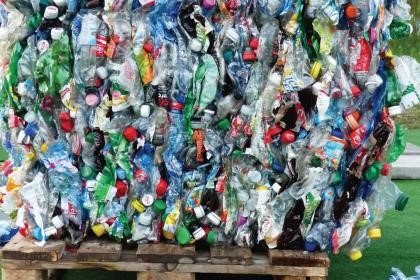Highlight 15/2022 – Doing their part: Putting the environment at the heart of trade negotiations at the WTO
Cyril Yemofio, 30 March 2022

Trade has always gone hand in hand with the environment. As WTO Director-General Ms Ngozi Okonji-Iweala eloquently stated on 15 December 2021, “problems of the global commons represent some of the biggest threats to the future prosperity and security of the people around the world.” The result of the Discussion on Trade and Environment led to the adoption of three instruments aimed at positively addressing the relationship between climate change and trade.
The first initiative is the Trade and Environmental Sustainability Structured Discussions, which recognises the importance of multilateral environmental agreements such as the United Nations Framework Convention on Climate Change (UNFCCC). This initiative strengthens the concrete actions of participating member states in expanding opportunities for environmentally sustainable trade in a transparent manner.
The second initiative concerns the Informal Dialogue on Plastic Pollution and Environmentally Sustainable Plastic Trade (IDP). It aims at improving the understanding of the effects of plastic pollution on the economy, especially those of developing countries and Small Island Developing States (SIDs). This dialogue also seeks to enhance transparency regarding trade policies relevant to reducing plastic pollution and shift to a more environmentally sustainable plastics trade. This initiative is crucial considering the consequences of plastic in the environment, especially in the ocean. A call for change in the way we handle plastic is thus long overdue.
The third initiative is the Ministerial Statement on Fossil Fuel Subsidies Reform, which was adopted to phase out inefficient fossil fuel subsidies and use in day-to-day activities. This initiative seeks to minimize the dependency and adverse impact of inefficient fossil fuels on development, in a way that protects poorer communities. It should also examine sustainable replacements, that is clean energy solutions that can be used whilst phasing out fossil fuel consumption. The transition from fossil fuels to cleaner, renewable energy is crucial to meet the goals of the Paris Agreement. The gradual shift from coal, crude oil and natural gas to solar, wind and possibly nuclear energy are some of the targets that will be pursued with more subsidies and investment opportunities for green and renewable energy sources.
So far, these initiatives have received a positive reception from the WTO member states. This is encouraging, as the initiatives underline a recognition of environmental concerns and a willingness to put those at the top of the list when it comes to trade negotiations. The increased attention granted to the correlation between trade and environmental protection opens the door to more innovative thinking in sustainable trade. Will we one day see a WTO agreement with the sole objective of promoting sustainable trade? The likelihood of this happening is increasingly high.
Cyril Yemofio, Highlight 15/2022 – Doing their part: Putting the environment at the heart of trade negotiations at the World Trade Organization, 30 March 2022, available at www.meig.ch
The views expressed in the MEIG Highlights are personal to the author and neither reflect the positions of the MEIG Programme nor those of the University of Geneva.
